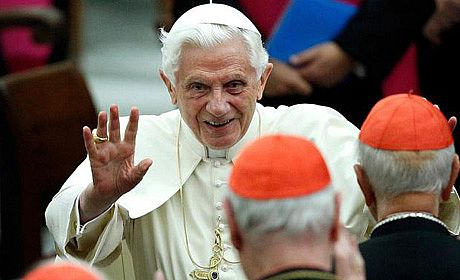Pope’s Timely Goodbye

To what extent can it be said that the role and status of the Pope in the modern world has been increased? Has the expansion of globalization intensified the responsibilities and duties of Pope? Do the religious leaders of the Church have impacts on the new world?
Firstly, the world is moving on its own path regardless of the desires of the religious leaders. 7 billion people live in the world and the process of globalization is a huge growing process. Nevertheless, it is obvious that the more the religious leaders lead the bigger assemblies, the more their impacts will be. The Catholic Church claims to have 600-800 million followers. Certainly the person who leads these people in different continents has influences. Therefore, it must be said that both Pope Benedict XVI and the previous Pope have impacted political and moral issues and have made efforts to affect global processes with their statements, positions and visits to different parts of the world.
Can it be said that this resignation is also related to these global processes?
To see this resignation as a complete result of world developments is perhaps not completely correct, for Pope Benedict XVI had resigned several times due to his age before being appointed as the Pope. There is a law in the Catholic Church that the cardinals who reach the age of 75 can ask for retirement and he had demanded his retirement several times at that time, but he had continued his duties on the request of Pope John Paul II. Even after he became the Pope he stated in a speech that, “I will lead the church for a short period of time.” Hence, it seems that his age and his physical health and concern for his lack of ability to perform his duties have been the most important reasons behind his resignation.
Nevertheless, it can be said that there are numerous issues in today's world, especially in the Vatican Church, which have impacted this resignation. In particular, the issue of pedophilia in the Catholic Church, the reports of which have been constantly published during recent years, has exerted more pressure on him. In addition to the internal affairs of the Catholic Church, global issues and disputes have also been involved in the Pope's resignation.
How would you assess the leadership role of Pope Benedict XVI?
This issue cannot be explicitly judged. His efforts during the past years have been accompanied with numerous ups and downs. In the first stage, it should be said that he was a brave Pope; perhaps his bravery is about the time when he was a soldier in Germany during the war. His bravery sometimes caused him to make incorrect tumultuous statements. For example, in September 2006 and in Regensburg University in the German province of Bavaria, he quoted a statement from one of the Emperors of Eastern Rome called Manuel II from the Palaiologos dynasty which upset many Muslims. In this statement, he said that the Christian Church is based on rationalism but Islam is not. This led to numerous reactions from scholars in the world of Islam and it was an unwise statement. But he stood firm against the pedophilia in the church and reduced its bureaucracy.
How successful were his actions with regard to the Muslims?
He took a wise distance with the Jews. From the first days of his appointment, the orthodox Jews treated him with caution; for they knew that he was a German and later it was revealed that he was a member of the Nazi army. The Jews were a little concerned about this issue and it is true that he visited Israel and Jerusalem and the Palestinian territories, but he did not have as close a relation with the Jews as the previous Pope. It seems that during these eight years, he tried to reconstruct the relationship between the Church and the world of Islam. That is why he made several trips to Islamic countries including Turkey, Lebanon, and Jordan and visited Imam Hussein Mosque in Amman.
Therefore, he made efforts to establish close relations between Islam and Christianity, even though there are misunderstandings between the worlds of Islam and Christianity which cannot easily be solved. Except that statement, Pope Benedict XVI did not show a hostile approach towards Islam and the Muslims. He took positions against insulting the Prophet and burning the Quran and condemned insults to the Prophets and divine religions. His visits to Islamic countries and welcoming delegations and holding talks with them were indicative of the Pope's outlook beyond Christianity. Thus, it should be said that Pope Benedict XVI was more successful in the area of interactions and dialogue among religions.

